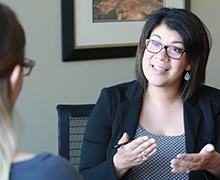Daring to dream

Daring to dream
- May 7, 2015
- Grad student Edelina Burciaga compares the educational opportunities and social mobility of undocumented young adults in California and Georgia
-----
Edelina Burciaga loves her job.
Though it’s not technically a “job” yet—she’s conducting research as a graduate student in sociology—the former lawyer who holds both her B.A. and M.A. from Stanford University has been able to create a life for herself that she finds incredibly fulfilling. And as a third generation Latina (her grandparents never completed elementary school and her mother was the first in her family to attend college) she understands the privilege of directing her own career path.
“My parents grew up as farmworkers in California’s Central Valley,” she explains. “My mom went to college. She had a good job but she didn’t love her job; the same with my dad. So it’s really a privilege for me to do research and pursue questions that I’m interested in. I determine how my day goes. … I think that’s what I’m most proud of; that I do work that I love.”
But while Burciaga is able to appreciate the opportunities afforded to her, she also knows that for the nearly 2 million undocumented immigrants that belong to the 1.5 generation, her path may be out of reach. So, with new funding, including a National Science Foundation grant for $11,897 and a recently awarded $25,000 Ford Foundation Dissertation fellowship, she is determined to shed some light on the challenges that this specific demographic faces.
---
Classified as having arrived in the country as children without legal status before the age of 13, members of the 1.5 generation remain undocumented and therefore face a unique set of challenges compared to first generation immigrants and their U.S.-born, second generation children. Most have grown up with the cultural ideals and values of this country but, without citizenship, are unable to receive many of the rights afforded to legal U.S. residents—including opportunities for higher education.
States like California are moving in a more welcoming direction—for instance, undocumented students that graduated from high school in the state are able to take advantage of in-state tuition at public universities and campuses like UCI have organized groups to support these students. But states like Georgia that have recently seen an influx in their populations of undocumented residents have started enacting exclusionary policies and procedures specifically targeting those seeking a college education.
These policies and their effects on the social mobility of students are what inspired Burciaga’s research and her dissertation, in which she compares the experiences of 1.5 generation young adults in metropolitan Los Angeles to those in Atlanta, Georgia, where undocumented students are banned from attending the top five public colleges and universities in the state. In addition, all noncitizens must pay out-of-state tuition at any public school they attend, “which basically functions as an economic ban,” according to Burciaga.
“I’m really interested in the role of those laws in shaping the trajectories and pathways of undocumented youth,” she explains. “I think it’s very interesting to think about how, in these two different contexts, people make choices and decisions about their future.”
Supporters of policies like Georgia’s believe that they are necessary in order to keep spots in these highly competitive schools open for legal U.S. citizens. But Burciaga argues that they are hostile laws that don’t have a place in this country.
“Laws like that don’t make sense in these states and they don’t make sense for the country,” she states. “And its not just because [these students] grew up here or that they speak English or they’re good students. It’s that … in a country that prides itself on providing opportunity and giving people at least the option, these types of laws run counter to those state values.”
---
With a background in community-based lawyering, Burciaga is not a stranger to policies and procedures - like those in Atlanta - that discriminate against immigrants either. But she has shifted her focus a bit since beginning her career at UCI.
“I’ve definitely expanded my perspective on it in terms of looking at the role of laws in shaping peoples futures, looking at collective action and how people come together to empower themselves, to assert agency and to make the world a place that they feel comfortable and safe living in.”
And she hopes to facilitate some collective action herself, by partnering with the on-campus organization, DREAMS at UCI, to bring members of Atlanta’s Freedom University - which organizes volunteer professors to offer college level courses to Georgia’s undocumented students - to our campus sometime next year.
“I think it would be really great to bring students who are at Freedom University to UCI to talk about what it’s like to be an undocumented immigrant and student in Georgia,” she says. “It would be so nice to see them again and also bring that perspective to California. … I think my dissertation topic is interesting because it can have broader impacts right here on my campus.”
And, of course, the topic also resonates with her on a personal level.
“Both of my parents raised us with a firm belief in the power of education, both to empower you but also to help you move up in the world,” she explains. “I always really carry that history with me because I think it’s important for first generation college students to know that they can make it and things are possible.”
-Bria Balliet, School of Social Sciences
-----
Would you like to get more involved with the social sciences? Email us at communications@socsci.uci.edu to connect.
Share on:
Related News Items
- Careet RightDickson receives grant to apply computational cognitive models to language acquisition
- Careet RightUCI sociologists earn American Sociological Association honors, leadership roles
- Careet RightMultiple honors for UCI soc sci's Maricela Bañuelos
- Careet RightA lesson in solidarity
- Careet RightUCI sociologists are making their mark


